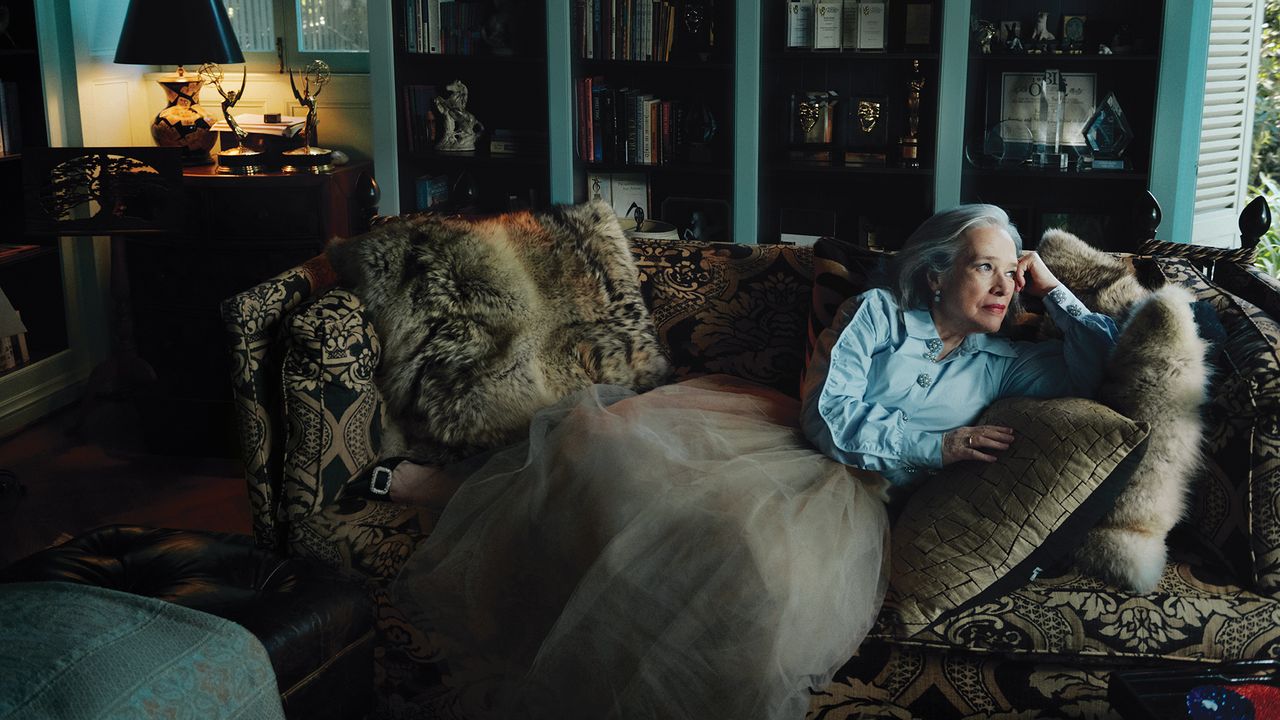Onscreen, Bates built up an unusual filmography as an adored star who rarely played the lead. Oscar nominee Alfre Woodard met her in the ’80s New Yor
Onscreen, Bates built up an unusual filmography as an adored star who rarely played the lead. Oscar nominee Alfre Woodard met her in the ’80s New York theater scene, and they bonded over how to navigate their industry’s narrow-mindedness. “Both of us were looked at as the friend, the neighbor next door, the crazy one—the action away from the center of the frame, which always had a wilting, de-nourished white girl in the middle of it, honestly,” she says. Woodard observed Bates cultivating a dedicated fan base despite regular rejection from Hollywood. Her success “is not because of a production company, a studio, a director—it is those people that see her and just go, Ah. They identify something in her,” Woodard says. “They’re touched by something in her. She is beloved by regular people everywhere.”
“I don’t feel comfy,” Bates says now of working in Hollywood, even having lost 100 pounds within the last seven or so years. “I never felt that I belonged, but that’s okay. I see them sail away in their gowns….” Later, she leans in with a mischievous grin. “So now? It’s sweet revenge. Oh, Miss Beauty Queen, you had a career up until your 40s and you can’t work? Too bad!” Bates grimaces at the comment. It came out harsher than intended. But the Bates emerging in this moment, an hour into lunch, is liberated—boisterous and heated, proud and profane. “I’ll think, Oh, you shouldn’t say this; oh, you shouldn’t say that,” she says. “But then I say, ‘Fuck it—I’m 76. Can’t I just say it?’ ”
And when Bates says fuck, trust: She’s letting you in. The more she sprinkles the word into our back-and-forth, the more liberated she appears. It’s a regular presence on her sets too. “Often when she saw me approaching with direction between takes, she’d say, ‘What? What, you fucker, what?’ ” Alexander Payne, who directed Bates to an Oscar nod for 2002’s About Schmidt, tells me in an email. “I’d keep my comments as concise as possible and watch her processing them like a finely tuned machine. Then I’d watch in wonder as my small directions rippled through the next take.”
About Schmidt remains the project where Bates was most literally naked onscreen. She played the eccentric and free-spirited Roberta, who at one point makes a pass at Jack Nicholson’s eponymous grump in her balmy tub. Bates and Payne had several long conversations about how to shoot it. “He was talking about getting a merkin; I was overweight, so I didn’t want to do that,” Bates says. “My tits were really big, and it was a problem because my tits kept floating to the surface. That was a difficult moment: Sitting in the tub with Jack, he’s talking about how he had done some Japanese painting of a gorilla that he was giving to somebody. He was talking about Churchill. All these things. And I had a cosmopolitan, or maybe two—I had to relax.”
But Bates committed—and always collaborated with an intense, invigorating focus. “I remember her calling me one evening to ask whether she could alter the preposition to to on,” Payne says. “I glanced at the script and saw, to my horror, that she’d found a typo.” This echoes Snyder Urman’s experience with Bates on Matlock: “She comes into the edit after I do my cut and watches and gives me ideas. If there’s a false note in a script, she’s going to find it.”
Bates found her first great post-Misery role in another Stephen King adaptation, Taylor Hackford’s decades-spanning Dolores Claiborne (1995), giving one of her deepest, most haunting performances as a woman accused of murder. She credits her success in the movie in part to the movement coach, dialect coach, and star hair-and-makeup team that were hired as she requested. “It’s like veterinary medicine—each part is a different animal,” Bates says. “You’ve got to figure out where the tail is, where the heart is, all that stuff.”
In the behind schedule ’90s, colleagues increasingly took note of Bates’s piercing filmmaking instincts. Bates received her second Oscar nomination for 1998’s Primary Colors, the Clinton campaign–inspired political drama, and she helped director Mike Nichols in choreographing a elaborate scene involving the results of a bombshell paternity test. In Titanic, meanwhile, Bates portrayed the “unsinkable” socialite Molly Brown, who at one point encourages Kate Winslet’s Rose to join her elitist mother, Ruth (Frances Fisher), on a lifeboat to safety, leaving behind some less fortunate—effectively doomed—passengers. Rose is reluctant, though, and ultimately stays behind. Working out how to approach the scene, Winslet turned to Bates.
“Kate came over to me and she said, ‘Can you just give me an idea of this?’ and I said, ‘Give me a minute,’ ” Bates says. “When I came back from thinking, I said, ‘This is the first and last time she’s going to see her family for who they really are.’ ”

COMMENTS